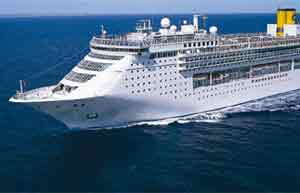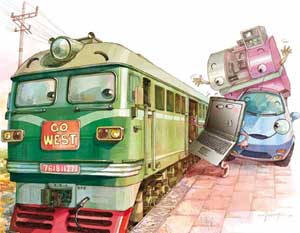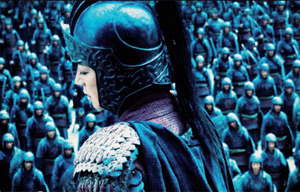Surplus trend points to declining export reliance
Updated: 2011-10-25 07:59
By Wei Tian (China Daily)
|
|||||||||
BEIJING - The significance of the current-account surplus to China's GDP growth is waning, suggesting a decline in the country's dependence on exports and a structural change in the world's second-largest economy, the country's top banker said.
The current-account surplus as a percentage of GDP will be about 4 percent this year, Zhou Xiaochuan, governor of the People's Bank of China, told an economic forum in Beijing on Monday.
The proportion fell from about 10 percent in 2007 to 5.2 percent in 2010 and will show a "significant decline" this year, Zhou said.
Although Chinese statistics show the percentage dipped to 2.8 percent during the first three quarters of this year, Zhou noted that the Christmas season will raise the full-year total as seasonal exports rise.
Zhou also said the overall surplus of China's international payments might still be "relatively large" this year, as foreign direct investment is expected to remain strong because of excessive liquidity and weak growth in developed economies.
Zhou revealed that China might ease restrictions on its citizens' use of foreign exchange as the country progresses toward more balanced international payments.
The idea would "not be for ordinary people to hold foreign exchange in their own hands, but for them to decide on their own to use it for opportunities like investment", Zhou said, without giving a timeline for any policy change.
However, Zhou's optimism isn't universally shared.
Song Hong, an international trade expert with the Institute of World Economics and Politics at the Chinese Academy of Social Sciences, said it is still too early to declare that "seemingly balanced trade" is approaching.
"The sharp decline in the trade surplus is mainly because of external pressures such as increasing commodity prices and trade friction," Song said.
China's trade account will not move into balance, and the economy will not achieve a structural optimization, unless the country accelerates its technical innovation and improves the quality of its massive labor force, he said.
Yuan Gangming, a researcher at Tsinghua University, said Zhou's prediction of a 4 percent current-account surplus will be higher than the actual figure, but the country cannot afford too large a decline in exports.
Yuan said tight credit to the manufacturing sector is nothing to boast of, as it has caused serious problems for private businesses. However, the situation might have improved after Premier Wen Jiabao's visit to Wenzhou, where the situation is the most serious.
Zhou Mubin, vice-chairman of the China Banking Regulatory Commission, reiterated at the forum that there would be support for small- and medium-sized enterprises, including a higher tolerance in banks' risk provisioning.
PMI rebounds
The preliminary HSBC China Manufacturing Purchasing Managers Index, a gauge of nationwide manufacturing activity, rebounded strongly in October, rising to 51.1 from a final reading of 49.9 in September, HSBC Holdings PLC said on Monday.
"All these data confirm our view that there is no risk of a hard landing in China," HSBC Chief Economist for China Qu Hongbin said in a statement.
GDP growth slowed to 9.1 percent in the third quarter from 9.5 percent in the second quarter and 9.7 percent in the first.
Growth is expected to slow further. A Reuters poll found that analysts forecast growth to weaken to 8.6 percent in 2012 from 9.3 percent this year.
Most analysts believe the statistics indicate an economic soft landing, rather than a crash. Many define a hard landing for China as a sudden dip in quarterly GDP growth below 8 percent, which they say could drive up unemployment.
However, the government has announced measures to support the economy. In comments published on Sunday, Wen said that the government would make job creation a more urgent priority.
Reuters contributed to this story.











